|
|
|
Sort Order |
|
|
|
Items / Page
|
|
|
|
|
|
|
| Srl | Item |
| 1 |
ID:
174002
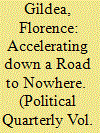

|
|
|
|
|
| Summary/Abstract |
In Inventing the Future, Nick Srnicek and Alex Williams implore those on the left not to fear automation but rather to harness it in order to overturn neoliberalism. However, their argument is built upon a controversial philosophy which goes unnamed in the body of the text: accelerationism, the first principles of which would overthrow the very understanding of human nature on which Western democracy has operated for centuries. Their vision also entails a way of doing politics and designing policy which radically differs from representative democracy and grassroots movements as they seek to engineer consent and to form a revolutionary vanguard—not just to overthrow capitalism, but to embark on a journey of continually re‐engineering humanity itself.
|
|
|
|
|
|
|
|
|
|
|
|
|
|
|
|
| 2 |
ID:
173998
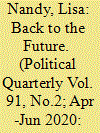

|
|
|
|
|
| Summary/Abstract |
Growing divisions between Britain’s towns and cities have created a dilemma for the Labour Party in seeking to represent very different parts of the country. There are some who argue that Labour must choose the global networked youth—who largely reside in cities—in order to maximise its electoral chances. This is an argument that defies electoral gravity and fails to address the root causes of the gulf between towns and cities. As jobs and investment have gone into cities, many towns have seen the local population age and local economies become unsustainable. In both towns and cities there is a clamour for power to move closer to home and for the renewal of democratic institutions, offering Labour the chance to win power and end the divisions that have come to characterise British politics.
|
|
|
|
|
|
|
|
|
|
|
|
|
|
|
|
| 3 |
ID:
174015


|
|
|
|
|
| Summary/Abstract |
Northern Ireland has always been a polity noted for its strong links between national identity, religion, and voting, and acute British unionist versus Irish nationalist divisions. The constitutional question of whether Northern Ireland should be part of the UK or a united Ireland dominates. Yet, recent surveys have suggested a sizeable and growing section of its electorate declares itself neither unionist nor nationalist. This development may have assisted the growth of the centrist Alliance Party, which rejects unionist and nationalist identities and claims to be neutral on Northern Ireland’s constitutional status. Alliance doubled its vote across three elections in 2019 and is now the third largest party in the region. This article examines the importance of ideological dealignment relative to other factors, such as Alliance’s opposition to Brexit, in explaining the rise of a non‐binary party in a divided society.
|
|
|
|
|
|
|
|
|
|
|
|
|
|
|
|
| 4 |
ID:
173995


|
|
|
|
|
| Summary/Abstract |
Post‐work politics, with a focus on universal basic income, rather than an agenda of saving jobs and improving the quality of work, has been a growth area on the left. This article challenges the views of proponents that their claims are ‘on trend' with developments in markets and technology. It does so by examining two supposed ‘tipping points' concerning crises in the production of value in capitalism and in the availability of and attachment to work. Through a rigorous examination of available evidence, the article demonstrates that the stories contained in post‐work discourses about business models, technologies, labour markets and workers are not empirically sustainable. Suggestions are then made about what more credible accounts of actually existing capital, technology and labour might look like, and what the direction of alternative, progressive policy agendas might be.
|
|
|
|
|
|
|
|
|
|
|
|
|
|
|
|
| 5 |
ID:
173999
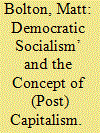

|
|
|
|
|
| Summary/Abstract |
This article explores the ‘democratic socialism’ being proposed by new left movements on either side of the Atlantic, and evaluates its claim to be a form of anti‐ or postcapitalism. It argues that in the democratic socialist worldview, the line between capitalism and socialism rests on the balance of power between workers and capitalists in the economic sphere. While traditional social democracy seeks to redistribute wealth but leaves relations between workers and capitalists within firms untouched, democratic socialism seeks to abolish private property in the economic sphere. Production is controlled democratically by the workers themselves, in league with a workers’ state. The article critically appraises the claim that such a scenario constitutes a form of postcapitalism. Drawing on the work of critical Marxists such as Moishe Postone, it argues that capitalism is not primarily defined by private property relations in the economic sphere, but rather the peculiar social form of capitalist labour. Unlike in pre‐capitalist societies, for labour in capitalism to secure a continued basis on which to reproduce the means of subsistence, it must be socially validated as ‘value‐producing’. The criteria for value validation is not set in the workplace, or within a single nation state, but rather on the world market. The article concludes that, for all its merits, the democratisation of workplaces does not overcome the need for this social validation, but rather constitutes an alternative form of managing the process of production in this context. As such, democratic socialism, like social democracy, remains susceptible to the same imperatives and crises as other forms of capitalist production, and so cannot be said to constitute a form of ‘postcapitalism’.
|
|
|
|
|
|
|
|
|
|
|
|
|
|
|
|
| 6 |
ID:
173992


|
|
|
| 7 |
ID:
174013


|
|
|
|
|
| Summary/Abstract |
South Korea–Japan relations are at their lowest point in decades, as colonial era disputes flare once again. Most pundits argue that the South Korean public is strongly united against Japan. We argue that South Korean elites are sharply divided over how to manage the crisis; this division is starting to impact how South Koreans understand colonial era narratives; and, long‐term, bilateral relations depend on how these growing divisions play out. Despite state censorship, a rising counter‐narrative in South Korea challenges the dominant, Manichaean, anti‐Japanese one. For the first time, Korea and Japan have a realistic chance of reconciling based on liberal public discourse and a nuanced, empirically based understanding of history.
|
|
|
|
|
|
|
|
|
|
|
|
|
|
|
|
| 8 |
ID:
173997
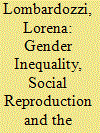

|
|
|
|
|
| Summary/Abstract |
Despite extensive attention being paid to the effects of the Universal Basic Income (UBI) on society at large, there has been little analysis on the relationship between gender inequality and UBI. The purpose of this article is first to reflect on the feminist arguments in favour of UBI and then to examine some of these points by also considering other available policies. By looking into the role of women’s work in both productive and reproductive activities, it is argued that UBI should not be disregarded as a social policy. However, its transformative capacity to empower women and to strengthen their role in society should not be overestimated. In order to address this gap, policy makers should address misconceptions around gender norms and acknowledge the multiple forms of women’s work across the social relations of production and reproduction.
|
|
|
|
|
|
|
|
|
|
|
|
|
|
|
|
| 9 |
ID:
174010


|
|
|
|
|
| Summary/Abstract |
The use of political violence to attain political goals has long been a source of concern. Once thought to be exclusive to countries with high levels of general violence, recent evidence suggests that harassment and intimidation of political elites in the UK is more widespread than previously thought. Using data from the 2017 general election candidate survey, we find that four in every ten candidates experienced at least one type of harassment. Evidence suggests that women and young candidates are more likely to suffer from harassment and intimidation. We conclude by formulating an agenda for future research, focussing, in particular, on the perception of harassment and the effect of harassment on political careers.
|
|
|
|
|
|
|
|
|
|
|
|
|
|
|
|
| 10 |
ID:
174004
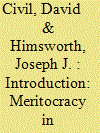

|
|
|
|
|
| Summary/Abstract |
Sixty years after its publication, Michael Young’s The Rise of the Meritocracy remains one of the most important texts for understanding the changing intellectual politics of postwar Britain. Young’s fictional vision of a meritocratic society explores the consequences of a society where each citizen is judged according to the formula ‘I.Q. + Effort = Merit’. The successful meritocrats hoard ever‐greater rewards for themselves, crystallising into a rigid and repressive elite who rule over an increasingly powerless and depressed underclass. While the concept has evolved and adapted, the language of meritocracy is one of the great survivors of postwar British politics. In an age characterised by the rise of populist leaders and movements, as well as a backlash against educated ‘liberal elites’, revisiting, reinterpreting and re‐evaluating Young’s influential satire and the central place the concept of meritocracy occupies in the history of postwar Britain has never been more important.
|
|
|
|
|
|
|
|
|
|
|
|
|
|
|
|
| 11 |
ID:
174009
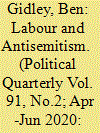

|
|
|
|
|
| Summary/Abstract |
In this article, we argue that Labour’s antisemitism crisis has been misunderstood. We suggest that a more accurate and sophisticated understanding of antisemitism offers a way forward. There are three elements to this claim. First, by drawing on existing data on attitudes towards Jews, we criticise the widespread focus on individual ‘antisemites’, rather than on the broader problem of antisemitism. In turn, we conceive of antisemitism not as a virus or poison, as in so many formulations, but rather, as a reservoir of readily available images and ideas that subsist in our political culture. Second, following on from this understanding, we offer five ways forward. Finally, we set this analysis in the context of a historical parting of the ways between anti‐racism and opposition to antisemitism. An anti‐racism defined solely by conceptions of whiteness and power, we argue, has proven unable to fully acknowledge and account for anti‐Jewish racism.
|
|
|
|
|
|
|
|
|
|
|
|
|
|
|
|
| 12 |
ID:
174007
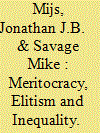

|
|
|
|
|
| Summary/Abstract |
The appeal of meritocracy is plain to see, because it appears to promote equality of opportunity. However, in this paper we argue that meritocracy is also a deeply elitist project. Firstly, we place Michael Young in context to show how his critique of meritocracy should be understood as a socialist vision to ameliorate class divides. Secondly, we show how economic inequality in the UK has not generated systematic resistance: in fact, inequality and belief in meritocracy have gone hand in hand. Thirdly, we argue that people see their own lives as meritocratic rather than ascribed, and that such values are deeply embedded in popular life. We offer two explanations for how such views have come about, and show how they have helped construct a more unequal society.
|
|
|
|
|
|
|
|
|
|
|
|
|
|
|
|
| 13 |
ID:
174014


|
|
|
|
|
| Summary/Abstract |
Reshuffles are a relatively common occurrence in British politics. We expect to see them whenever a new Prime Minister enters Downing Street, after elections and following ministerial resignations. Recent research from the Institute for Government warns that the regular churn of ministers has negative consequences for policy making and for parliamentary accountability. This article summarises their latest research and what this tells us about the potential implications of Boris Johnson’s February 2020 reshuffle on government and Parliament.
|
|
|
|
|
|
|
|
|
|
|
|
|
|
|
|
| 14 |
ID:
174016


|
|
|
|
|
| Summary/Abstract |
Demands for a second Scottish independence referendum have persisted since 2014. The Scottish government introduced the Referendums (Scotland) Bill at Holyrood in May 2019 to enable referendums within the competence of the Scottish parliament. The Scottish National Party (SNP) government presented this as a framework enabling a range of referendums. Opponents saw this as legislating for a second independence referendum. The act will form a large part of the legal framework and rules for any second independence referendum. Importantly, the legislation provides innovation in electoral law more generally. This article discusses the background to the bill, its initial contents, and debates around and amendments to the bill. It discusses its electoral law innovations, before considering its limitations and place as constitutional debates play out over a second independence referendum.
|
|
|
|
|
|
|
|
|
|
|
|
|
|
|
|
| 15 |
ID:
174003
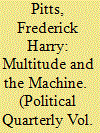

|
|
|
|
|
| Summary/Abstract |
There has been a proliferating literature on postcapitalist and post‐work futures in recent years, underpinned by policy proposals like the basic income and a reduction in working hours. It has gained increasing uptake within left electoral politics and policy making. The generational potency of these ideas require that we understand their theoretical roots. This article considers the interplay between the work of Michael Hardt and Antonio Negri and the new postcapitalism exemplified by the likes of Paul Mason and Aaron Bastani, as well as its relationship with intellectual currents around Corbynism and the wider contemporary left. Through a discussion of their latest book, Assembly, it will be seen that Hardt and Negri both inform, and are increasingly informed by, the postcapitalist and post‐work thinking popular on the left today—in particular at its ‘posthumanist’ fringes. However, this recent work is characterised by a series of tactical redirections that, rather than indicating renewal, reflect the potential collapse of this utopian framework for the future in the face of a rapidly unravelling global political context. Whilst the determinist understanding of social transformation cannot permit these setbacks, this shines a light on more general shifts in left strategy and analysis.
|
|
|
|
|
|
|
|
|
|
|
|
|
|
|
|
| 16 |
ID:
174008
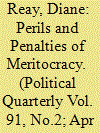

|
|
|
|
|
| Summary/Abstract |
This article deploys insights from Michael Young’s 1958 satire The Rise of the Meritocracy to challenge the dominant ideology of meritocracy in contemporary British society. It draws on ethnographic research in schools over a twenty‐five year period to illustrate the damage the illusion of meritocracy inflicts on children and young people, but particularly those from working class backgrounds. It argues that the consequences of the pretence of meritocracy are to be found in everyday practices of testing, hyper‐competition and setting, and beyond the classroom in the designation of predominantly working class schools as ‘rubbish schools for rubbish learners’. It concludes that, beyond the negative consequences for working class learners, there are wider consequences for British society, exacerbating social divisions and encouraging the growth of distrust, prejudice, envy, resentment, and contempt between different social groups.
|
|
|
|
|
|
|
|
|
|
|
|
|
|
|
|
| 17 |
ID:
173993


|
|
|
|
|
| Summary/Abstract |
This article introduces the special issue on the politics of postcapitalism. Considering the theoretical foundations, empirical perspectives and political ramifications of claims made about a coming ‘post‐work’ or ‘postcapitalist’ society, it maps existing debates through a discussion of two key recent texts, Paul Mason’s Clear Bright Future and Aaron Bastani’s Fully Automated Luxury Communism. It first surveys how the relationship between labour market trends, technological change and wider political‐economic shifts is articulated in the postcapitalist literature. It then explores how concepts from Marx are deployed to depict social relations as a constraint on technological development and its utopian potentialities, leading to political demands for new class actors and electoral blocs centring on the new forms of economic and political activity associated with digital networks. It also considers the role of the state and how this theoretical and political approach envisions historical change, situating utopian visions of an incipient postcapitalist alternative to capitalism within the contemporary political context of authoritarian populism and challenges to liberal democracy. Finally, it explores the continuing relevance of humanism as a critical counterpoint to the social and philosophical agenda of present day ‘posthumanism’. It concludes that, in unfavourable political conditions, it would be strategically unwise to stake too much on an over‐optimistic approach to the unfolding future. This outlook, it is suggested, carries considerable risks and consequences for a contemporary left in search of a viable electoral coalition and route back to power.
|
|
|
|
|
|
|
|
|
|
|
|
|
|
|
|
| 18 |
ID:
174000
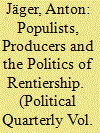

|
|
|
|
|
| Summary/Abstract |
Populism studies finds itself in a crisis of originality. While some scholars have signalled over‐usage, others have argued that by contextualising populism, we are able to specify our own ‘populist moment’ and remedy the term’s slipperiness. This article opts for the latter tactic through a comparison of two aspects of contemporary populism with late nineteenth century precedents. In the late nineteenth century, the American People’s Party pioneered a mode of mass politics anchored in agrarian and industrial labour which launched the term ‘populism’ in Western discourse. Contemporary populists show rhetorical and political overlap with this template, but also come up against two new constraints: (1) a stagnant capitalism increasingly centred on ‘rentiership’; and (2) a disorganised civil society. These factors render today’s populism resistant to analogy but also conceptually more specific, sharpening the contours of our populist moment.
|
|
|
|
|
|
|
|
|
|
|
|
|
|
|
|
| 19 |
ID:
173994
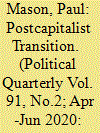

|
|
|
|
|
| Summary/Abstract |
The postcapitalism thesis asserts that open source and collaborative non‐profit organisations represent a new, non‐market sector in which the profit motive and monetary exchange no longer drive economic activity; in Marxist political economy terms, they are a new means for suppressing the law of value. Information technology has produced four systemic dysfunctions, limiting capitalism’s ability to function as a complex adaptive system: the zero marginal cost effect, the tendency to delink work from wages, positive network effects, and information asymmetries. In response, in addition to the traditional remedies of social democracy for a stagnant neoliberal economic model, left parties must adopt a programme of transition: aggressively breaking up technological monopolies; promoting universal basic income and basic service solutions; outlawing rent‐seeking business models; and promoting data democracy.
|
|
|
|
|
|
|
|
|
|
|
|
|
|
|
|
| 20 |
ID:
173996


|
|
|
|
|
| Summary/Abstract |
This article reviews geographical research on labour market changes that pose a challenge to ‘work’ as a compelling category of analysis. Drawing inspiration from feminist scholarship that has sought to develop a frame for thinking about the concept of work so that other activities outside employment are recognised, it considers what everyday practices of work, including domestic and reproductive labour, can teach us about the realities and futures of contemporary capitalism. While ‘work’ has long served as a presumed norm or telos of ‘development’, this article considers the prospect of the ‘end of work’ and of a specific type of accompanying capitalist society. It outlines the challenges for policy making in bringing forth a ‘post‐work’ world without cementing social and economic inequality.
|
|
|
|
|
|
|
|
|
|
|
|
|
|
|
|
|
|
|
|
|